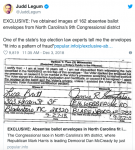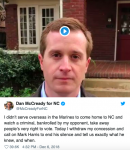https://www.newyorker.com/news/news...on-fraud-shake-north-carolinas-ninth-districtIn October, during the final stretch of the congressional election in North Carolina’s Ninth District—one of the most tightly contested House races in the nation—Datesha Montgomery opened her door, in Bladen County, to find a young woman who explained that she was collecting absentee ballots. “I filled out two names on the ballot—Hakeem Brown for Sheriff and Vince Rozier for board of education,” Montgomery wrote in an affidavit. Under North Carolina law, only voters themselves are allowed to handle or turn in their ballots, but the woman at Montgomery’s door “stated the [other races] were not important.” Montgomery added, “I gave her the ballot and she said she would finish it herself. I signed the ballot and she left. It was not sealed up at any time.”
Earlier this week, Montgomery’s complaint, along with four other sworn statements, and a sixth which was not notarized, were submitted to the North Carolina election board by a lawyer for the state’s Democratic Party. These affidavits, which were first reported by the Charlotte TV station WSOC, contain the following allegations: a woman going door to door saying “she was assigned to the district to collect absentee ballots”; one instance of an unrequested absentee ballot arriving at a voter’s house; “improper” election monitoring at a polling site; unusual “coding” on absentee ballots; and two men separately saying that they overheard people talking about payments to a local political operative working for the Republican candidate, Mark Harris. As of now, these anecdotes are, of course, purely allegations. But state officials have begun to explore whether these testimonies could help explain statistical irregularities in the absentee-vote count for the Ninth District, which had previously been called for Harris over his Democratic opponent, Dan McCready, by a margin of nine hundred and five votes (out of around two hundred and eighty thousand cast).
North Carolina’s Ninth Congressional District begins in the Democratic suburbs of Charlotte, but the gerrymandered counterweight, which has kept the seat in Republican hands since 1963, is a rural Republican stronghold stretching east along the South Carolina state line. It is here, in Bladen County and the neighboring Robeson County, that the problems began. Steve Stone, the chairman of the Robeson County Board of Elections, told the Washington Post that election officials became concerned in August by people dropping off large numbers of registration forms and absentee-ballot requests. He said that county residents had also made reports of people going door to door, telling voters that their registrations had been dropped, that they needed to re-register, and that they should sign an absentee-ballot-request form. The large number of complaints prompted state investigators to seize completed absentee-ballot-request forms and envelopes from both counties in the days after the election.
On Tuesday, the state’s Board of Elections—made up of four Democrats, four Republicans, and one Independent—which tabulates and verifies every vote in the weeks after an election, shocked North Carolina’s political establishment by voting unanimously not to certify Harris’s win. “I’m very familiar with unfortunate activities that have been happening down in my part of the state,” Joshua Malcolm, the board’s vice-chairman and a Democratic resident of the Ninth District, said during the meeting. “I’m not going to turn a blind eye to what took place. To the best of my understanding, which has been ongoing for a number of years, that has been repeatedly referred to the United States Attorney and district attorneys to take action and clean it up.”
The board’s actions inspired J. Michael Bitzer, a professor of politics at Catawba College, near Charlotte, and a self-described “North Carolina politics data geek,” to reëxamine some of the voter returns. In Bladen and Robeson counties, Bitzer found that Harris won an unusually high share of mail-in absentee-ballot votes. Bladen was the only county where the Republican prevailed in the mail-in-absentee vote, winning sixty-one per cent of the votes from mail-in ballots—despite registered Republicans accounting for only nineteen per cent of the county’s returned absentee ballots. To achieve that margin, Harris would have needed to win not only all of the Republican ballots but almost every single mail-in vote from Independents, as well as a significant number of votes from crossover Democrats. Since posting his findings on his blog, Bitzer has been answering so many media calls that his voice has grown hoarse. “Now it feels more like an avalanche rather than the snowball effect,” he said. “It’s taken on a life of its own.”
It was not just the general election in which the numbers looked funny. Investigators are now looking into the Republican primary, in May, as well. Harris won with eight hundred and twenty-eight votes over the incumbent, Robert Pittenger, claiming ninety-six per cent of the absentee ballots in Bladen County—which was a far higher margin of victory than the rest of his totals in the county. Pittenger told Spectrum News on Thursday, “We were fully aware of [the accusations of fraud]. There are some pretty unsavory people, particularly out in Bladen County, and I didn’t have anything to do with them.”
In the general election, Bitzer also found that, compared to other counties in the Ninth District, a much higher rate of mail-in absentee ballots requested in Bladen and Robeson counties—about forty per cent and sixty-two per cent, respectively—were never turned in. In fact, those two counties had the highest rates of unreturned absentee ballots of any district in North Carolina. And an analysis of the voting data by the Raleigh News & Observer found that “the unreturned ballots are disproportionately associated with minority voters,” who tend to vote for Democrats over Republicans. In Robeson County, seventy-five per cent of the absentee ballots requested by African-Americans and sixty-nine per cent of those requested by American Indians were never received by the state. On Friday, Harris tweeted, “There is absolutely no public evidence that there are enough ballots in question to affect the outcome of this race.” But about sixteen hundred mail-in absentee ballots were requested in the two counties and not returned, in a race decided by fewer than a thousand votes. Nate Silver, a data journalist and the founder of FiveThirtyEight.com, tweeted in response, “There are enough ballots in question in NC-9 to potentially affect the outcome.”
“Was this just an anomaly of people requesting ballots and then deciding not to send them in?” Bitzer said. “Or is this evidence of a concerted effort to influence or impact the election?” Prior to the election, Bitzer told me, it would have been possible for someone interested in interfering with the election to determine through public records which voters had not yet returned requested absentee ballots. “So it would not be a stretch, if someone made a concerted effort to look at each day’s records, for that someone to find out where that particular voter lived, and then it would be easy enough to go and try to collect it themselves.” Such an action would not only be illegal because a ballot may be handled only by the voter who completes it but would also create the opportunity for electoral fraud. As Bitzer noted, “Let’s say, a voter handed over a ballot to a collector, and the voter had not secured it in a sealed envelope, and there was no vote in the congressional election. The collector could put a vote in. If there was a vote, but it was not for the right candidate, the collector could mark a vote for a second candidate and spoil the ballot.” But, Bitzer added, “These are hypotheticals. We just don’t know to say with certainty what happened. We’re trying to piece a puzzle together, and we may not even fully understand how many pieces are out there.”
On Friday, after a three-hour closed-door meeting, the board declined to certify the election for a second time. Both Democrats and Republicans voted to hear evidence about “claims of numerous irregularities and concerted fraudulent activities” at a meeting to be held by December 21st. A finding of fraud could result in a new election. At the end of the meeting, Andy Penry, the Democratic chairman, thanked the other eight members for their service, as the current board is authorized to operate only until 11:59 p.m. on Monday. The board has been mired in legal battles since its formation by a Republican supermajority in the state legislature, shortly after the Democratic governor, Roy Cooper, defeated the Republican incumbent, in 2016. A court ruling in October found that the legislature’s attempt to sidestep the governor was unconstitutional, but it allowed the current board to continue until Monday so as not to disturb the November election and certification process. Shortly after the board adjourned on Friday, a stay was granted to allow it to remain in operation until December 12th. Who will take charge of the election after that, however, remains unclear. On Saturday, Penry, who had been under attack by Republicans for his criticism of President Trump, resigned, explaining, "I will not allow myself to be used as an instrument of distraction in this investigation."
The North Carolina Republican Party has already threatened to sue if the current election results are not certified. Dallas Woodhouse, the executive director of the state Party, said, “Mark Harris got more legitimate votes. Mark Harris will be the congressman, and any effort not to do that would disenfranchise hundreds of thousands of voters.” David Lewis, the Republican chairman of the General Assembly’s Committee on Rules, Calendar, and Operations of the House, who would likely be a key figure in any battles over a reconstituted election board, tweeted on Friday afternoon, “I am extremely concerned about the severe lack of transparency by the Governor’s Board of Elections. . . . This legislature retains statutory and constitutional oversight authority to ensure that his control is not being abused for political gain. We will use it.” Meanwhile, on Friday, Harris was in Washington, D.C., along with other newly elected representatives, participating in a lottery to determine the order in which they would select their offices in government buildings. “With the tension between the Democratic governor and the supermajority Republican lame-duck legislature,” Bitzer said, “I would be the last to try and predict where this goes next week. Stay tuned.”
I guess Republicans really do play for keeps
#StraightShooter


